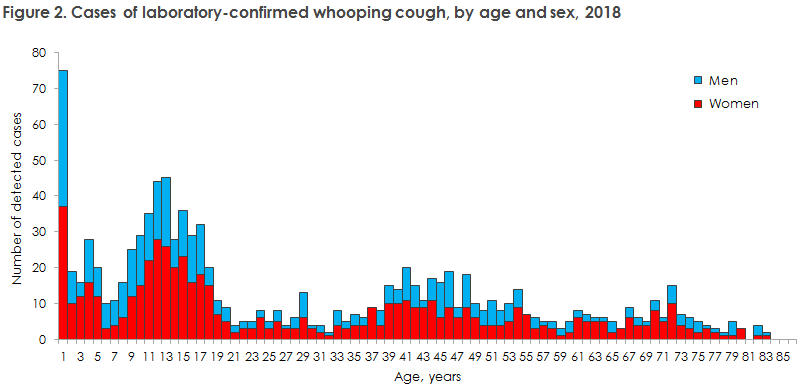Laboratory-confirmed whooping cough remained stable in 2018
The level of laboratory-confirmed whooping cough observed in 2018 was very similar to the level recorded before and after the 2016 epidemic. More were tested and fewer tested positive.
Shortly before Easter, Statens Serum Institut (SSI) published the figures summarising laboratory-confirmed whooping cough for 2018.
The new figures show that the whooping cough count for 2018 was in line with the level observed before and after the 2016 whooping cough epidemic. What the numbers do not show is that far more people were tested and that the share of positive findings has therefore decreased.
Particularly, the number of adult samples has increased considerably. In the 30+ years age group, as many as 5,647 samples were taken, compared with 3,859 samples in 2015. This corresponds to an approx. 46% increase.
“The increased number of tested samples indicates an increased population awareness about whooping cough following the 2016 epidemic, and particularly about the risk of whooping cough in all age groups and not just among children”, notes Staff Specialist Peter Henrik Andersen, SSI, commenting on the newly released figures.
A total of 1,023 whooping cough cases were detected in 2018. The incidence was highest on Funen, in North Zealand and in Copenhagen subs., which was also the case in 2017. The lowest incidence was observed in North Jutland.

Whooping cough in children below 2 years of age
Among the youngest age groups, 2018 brought a total of 104 whooping cough notifications in children below 2 years of age. This included 43 (41%) non-vaccinated children, whereas 15 (14%) had received all three primary whooping cough vaccinations. These vaccinations are normally given when the children are 3, 5 and 12 months old.
Even so, no deaths due to whooping cough were recorded among children below 2 years of age in 2018.
“Immunity following whooping cough vaccination or whooping cough disease lasts only for 4-12 years. Thus, the majority of the population is susceptible to whooping cough. A number of other countries have introduced booster vaccinations for teenagers. In contrast hereto, the Danish vaccination programme primarily aims to protect young children against whooping cough, as the disease can run a serious course in this age group”, explains Peter Henrik Andersen before continuing: “As infants do not receive relevant antibodies from their mother unless she is vaccinated late in pregnancy, it is important to ensure that the two initial vaccinations given at 3 and 5 months of age are administered without unnecessary delay”.
For more information, please see EPI-NEWS 15/19.